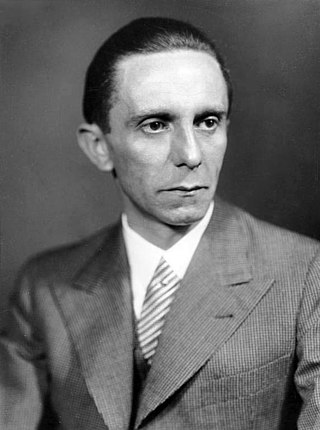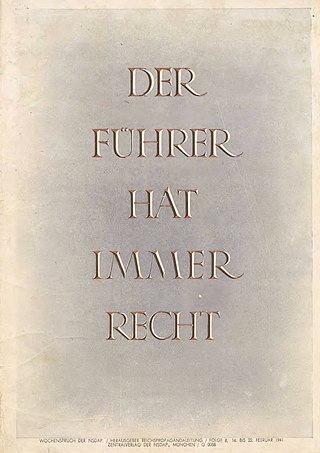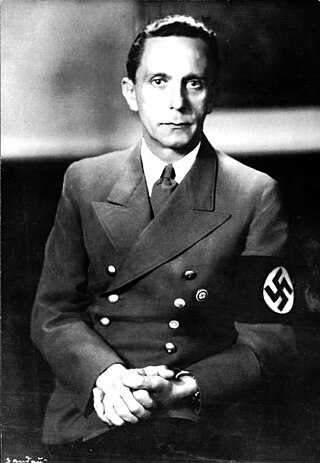Related Research Articles

Paul Joseph Goebbels was a German Nazi politician and philologist who was the Gauleiter of Berlin, chief propagandist for the Nazi Party, and then Reich Minister of Propaganda from 1933 to 1945. He was one of Adolf Hitler's closest and most devoted followers, known for his skills in public speaking and his deeply virulent antisemitism which was evident in his publicly voiced views. He advocated progressively harsher discrimination, including the extermination of the Jews in the Holocaust.

The 1936 Summer Olympics, officially the Games of the XI Olympiad and officially branded as Berlin 1936, was an international multi-sport event held from 1 to 16 August 1936 in Berlin, Germany. Berlin won the bid to host the Games over Barcelona at the 29th IOC Session on 26 April 1931, two years before the Nazi Party rose to power in Germany. The 1936 Games marked the second and most recent time the International Olympic Committee gathered to vote in a city that was bidding to host those Games. Later rule modifications forbade cities hosting the bid vote from being awarded the games.

Avery Brundage was the fifth president of the International Olympic Committee, serving from 1952 to 1972, the only American and only non-European to attain that position. Brundage is remembered as a zealous advocate of amateurism and for his involvement with the 1936 and 1972 Summer Olympics, both held in Germany.

In the political history of Germany, the Führerprinzip was the basis of executive authority in the Government of Nazi Germany (1933–1945), which meant that the word of the Führer is above all written law, and that government policies, decisions, and offices all work towards the realisation of the will of the Führer. In practise, the Führerprinzip was the dictatorship of the leader to dictate the ideology and policies of a political party; therefore, such a personal dictatorship is a basic characteristic of fascism.

Carl Diem was a German sports administrator, and as Secretary General of the Organizing Committee of the Berlin Olympic Games, the chief organizer of the 1936 Olympic Summer Games.
The Aryan Games were a proposed replacement for the Olympic Games in Nazi Germany. Proposed by Nazi sports organizer Carl Diem and subsequently adopted by Adolf Hitler, these multi-sport games were supposed to be housed permanently in Nuremberg at the planned "German Stadium", that had been designed by Nazi architect Albert Speer, but was never built.

The 1936 Summer Olympics, officially known as the Games of the XI Olympiad, was an international multi-sport event held in Berlin, Germany, from 1 August to 16 August.

Helene Julie Mayer was a German-born fencer who won the gold medal at the 1928 Olympics in Amsterdam, and the silver medal at the 1936 Olympics in Berlin. She competed for Nazi Germany in Berlin, despite having been forced to leave Germany in 1935 and resettle in the United States because she was of Jewish descent. She studied at American universities, and later returned to Germany in 1952 where she died of breast cancer.

Honorary Aryan was a semi-official category and expression used in Nazi Germany to justify the exceptional awarding of Aryan certificates to some regime-favoured Mischlinge who according to Nuremberg Laws standards would not have been recognized as belonging to the Aryan race, but whom German officials nevertheless chose to spare persecution.

The Reich Ministry for Public Enlightenment and Propaganda, also known simply as the Ministry of Propaganda, controlled the content of the press, literature, visual arts, film, theater, music and radio in Nazi Germany.
Historians, political scientists and philosophers have studied Nazism with a specific focus on its religious and pseudo-religious aspects. It has been debated whether Nazism would constitute a political religion, and there has also been research on the millenarian, messianic, and occult or esoteric aspects of Nazism.
Arnd Krüger is a German professor of sport studies. Krüger earned his BA from UCLA in 1967 and his PhD from the University of Cologne in Germany in 1971. He attended UCLA on a track scholarship, was 10 times German champion, and represented West Germany at the 1968 Summer Olympics in the 1500 metres run, where he reached the semi-final. He was one of the first Germans to be honored as All-American for being part of the UCLA Distance Medley Relay which ran faster than the World Record in 1965.

The anti-Nazi boycott was an international boycott of German products in response to violence and harassment by members of Adolf Hitler's Nazi Party against Jews following his appointment as Chancellor of Germany on January 30, 1933. Examples of Nazi violence and harassment included placing and throwing stink bombs, picketing, shopper intimidation, humiliation and assaults. The boycott was spearheaded by some Jewish organizations but opposed by others.

Charles Hitchcock Sherrill was an American politician, diplomat, sport officer, and author.

The propaganda of the Nazi regime that governed Germany from 1933 to 1945 promoted Nazi ideology by demonizing the enemies of the Nazi Party, notably Jews and communists, but also capitalists and intellectuals. It promoted the values asserted by the Nazis, including Heldentod, Führerprinzip, Volksgemeinschaft, Blut und Boden and pride in the Germanic Herrenvolk. Propaganda was also used to maintain the cult of personality around Nazi leader Adolf Hitler, and to promote campaigns for eugenics and the annexation of German-speaking areas. After the outbreak of World War II, Nazi propaganda vilified Germany's enemies, notably the United Kingdom, the Soviet Union and the United States, and in 1943 exhorted the population to total war.
Nazism, formally National Socialism, is the far-right totalitarian socio-political ideology and practices associated with Adolf Hitler and the Nazi Party (NSDAP) in Germany. During Hitler's rise to power in 1930s Europe, it was frequently referred to as Hitler Fascism and Hitlerism. The later related term "neo-Nazism" is applied to other far-right groups with similar ideas which formed after the Second World War when the Third Reich collapsed.

Music in Nazi Germany, like all cultural activities in the regime, was controlled and "co-ordinated" (Gleichschaltung) by various entities of the state and the Nazi Party, with Propaganda Minister Joseph Goebbels and the prominent Nazi theorist Alfred Rosenberg playing leading – and competing – roles. The primary concerns of these organizations was to exclude Jewish composers and musicians from publishing and performing music, and to prevent the public exhibition of music considered to be "Jewish", "anti-German", or otherwise "degenerate", while at the same time promoting the work of favored "Germanic" composers, such as Richard Wagner and Anton Bruckner. These works were believed to be positive contributions to the Volksgemeinschaft, or German folk community.

Theodor Lewald was a civil servant in the German Reich and an executive of the International Olympic Committee. He was the President of the Olympic organising committee for the 1936 Summer Olympics in Berlin.

During a speech at the Reichstag on 30 January 1939, German Führer Adolf Hitler threatened "the annihilation of the Jewish race in Europe" in the event of war:
If international finance Jewry inside and outside Europe should succeed in plunging the nations once more into a world war, the result will be not the Bolshevization of the earth and thereby the victory of Jewry, but the annihilation of the Jewish race in Europe.
References
- ↑ Hilton, Christopher (2006). Hitler's Olympics. United Kingdom: Sutton Publishing Limited. pp. 4–7. ISBN 0-7509-4292-4.
- ↑ The reason for this shift is discussed in more detail by Krüger, Arnd: “Heute gehört uns Deutschland und morgen...”? Das Ringen um den Sinn der Gleichschaltung im Sport in der ersten Jahreshälfte 1933, in: Wolfgang Buss and Arnd Krüger (eds.): Sportgeschichte: Traditionspflege und Wertewandel. Festschrift zum 75. Geburtstag von Prof. Dr. W. Henze. (= Schriftenreihe des Niedersächsischen Instituts für Sportgeschichte, vol. 2). Duderstadt: Mecke 1985, pp. 175 - 196. ISBN 3-923453-03-5
- ↑ Krüger, Arnd and William Murray. The Nazi Olympics. University of Illinois Press. 2003. ISBN 0-252-02815-5. page 20.
- ↑ Krüger, Arnd (2003). The Nazi Olympics. United States: University of Illinois Press. pp. 18. ISBN 0-252-02815-5.
- 1 2 Hilton, Christopher (2006). Hitler's Olympics. United Kingdom: Sutton Publishing Limited. p. 13. ISBN 0-7509-4292-4.
- ↑ Teichler, H. J. (1976). Berlin 1936--Ein Sieg der NS Propaganda?. pp. 265–306.
- ↑ Murray, William (2003). The Nazi Olympics. United States: University of Illinois Press. pp. 2. ISBN 0-252-02815-5.
- ↑ Hilton, Christopher (2006). Hitler's Olympics. United Kingdom: Sutton Publishing Limited. p. 20. ISBN 0-7509-4292-4.
- ↑ The XIth Olympic Games. Berlin: 1936 Official Report.
- 1 2 3 4 5 6 7 8 9 10 11 12 "The Nazi Olympics Berlin 1936". www.ushmm.org. Retrieved 2018-05-02.
- ↑ Krüger, Arnd (2003). The Nazi Olympics. United States: University of Illinois Press. pp. 22. ISBN 0-252-02815-5.
- ↑ Hilton, Christopher (2006). Hitler's Olympics. United Kingdom: Sutton Publishing Limited. p. 33. ISBN 0-7509-4292-4.
- ↑ Hilton, Christopher (2006). Hitler's Olympics. United Kingdom: Sutton Publishing Limited. p. 39. ISBN 0-7509-4292-4.